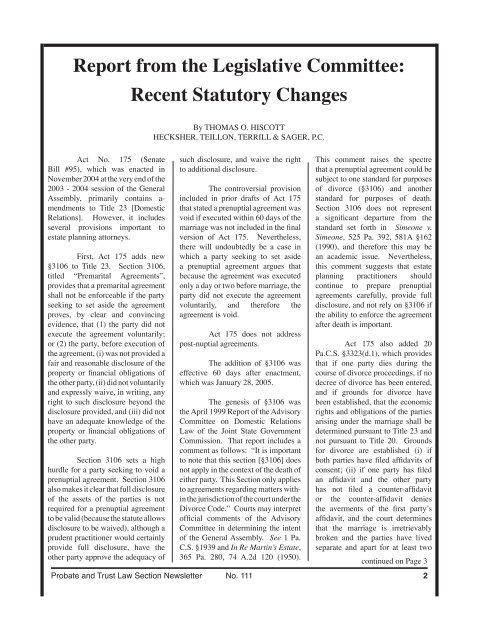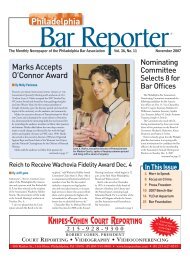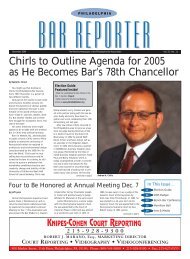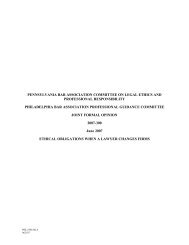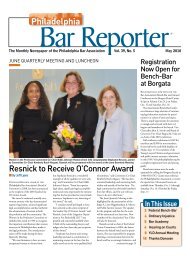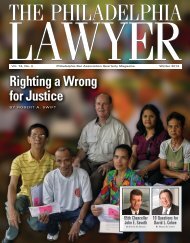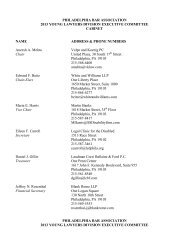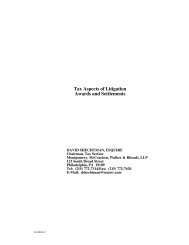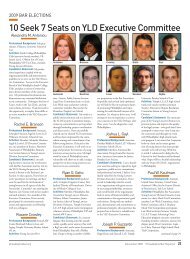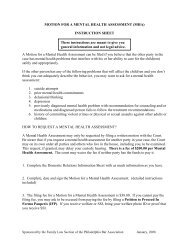Probate & Trust Newsletter: April 2005 - Philadelphia Bar Association
Probate & Trust Newsletter: April 2005 - Philadelphia Bar Association
Probate & Trust Newsletter: April 2005 - Philadelphia Bar Association
Create successful ePaper yourself
Turn your PDF publications into a flip-book with our unique Google optimized e-Paper software.
Report from the Legislative Committee:<br />
Recent Statutory Changes<br />
Act No. 175 (Senate<br />
Bill #95), which was enacted in<br />
November 2004 at the very end of the<br />
2003 - 2004 session of the General<br />
Assembly, primarily contains a-<br />
mendments to Title 23 [Domestic<br />
Relations]. However, it includes<br />
several provisions important to<br />
estate planning attorneys.<br />
First, Act 175 adds new<br />
§3106 to Title 23. Section 3106,<br />
titled “Premarital Agreements”,<br />
provides that a premarital agreement<br />
shall not be enforceable if the party<br />
seeking to set aside the agreement<br />
proves, by clear and convincing<br />
evidence, that (1) the party did not<br />
execute the agreement voluntarily;<br />
or (2) the party, before execution of<br />
the agreement, (i) was not provided a<br />
fair and reasonable disclosure of the<br />
property or financial obligations of<br />
the other party, (ii) did not voluntarily<br />
and expressly waive, in writing, any<br />
right to such disclosure beyond the<br />
disclosure provided, and (iii) did not<br />
have an adequate knowledge of the<br />
property or financial obligations of<br />
the other party.<br />
Section 3106 sets a high<br />
hurdle for a party seeking to void a<br />
prenuptial agreement. Section 3106<br />
also makes it clear that full disclosure<br />
of the assets of the parties is not<br />
required for a prenuptial agreement<br />
to be valid (because the statute allows<br />
disclosure to be waived), although a<br />
prudent practitioner would certainly<br />
provide full disclosure, have the<br />
other party approve the adequacy of<br />
By THOMAS O. HISCOTT<br />
HECKSHER, TEILLON, TERRILL & SAGER, P.C.<br />
such disclosure, and waive the right<br />
to additional disclosure.<br />
The controversial provision<br />
included in prior drafts of Act 175<br />
that stated a prenuptial agreement was<br />
void if executed within 60 days of the<br />
marriage was not included in the final<br />
version of Act 175. Nevertheless,<br />
there will undoubtedly be a case in<br />
which a party seeking to set aside<br />
a prenuptial agreement argues that<br />
because the agreement was executed<br />
only a day or two before marriage, the<br />
party did not execute the agreement<br />
voluntarily, and therefore the<br />
agreement is void.<br />
Act 175 does not address<br />
post-nuptial agreements.<br />
The addition of §3106 was<br />
effective 60 days after enactment,<br />
which was January 28, <strong>2005</strong>.<br />
The genesis of §3106 was<br />
the <strong>April</strong> 1999 Report of the Advisory<br />
Committee on Domestic Relations<br />
Law of the Joint State Government<br />
Commission. That report includes a<br />
comment as follows: “It is important<br />
to note that this section [§3106] does<br />
not apply in the context of the death of<br />
either party. This Section only applies<br />
to agreements regarding matters within<br />
the jurisdiction of the court under the<br />
Divorce Code.” Courts may interpret<br />
official comments of the Advisory<br />
Committee in determining the intent<br />
of the General Assembly. See 1 Pa.<br />
C.S. §1939 and In Re Martinʼs Estate,<br />
365 Pa. 280, 74 A.2d 120 (1950).<br />
This comment raises the spectre<br />
that a prenuptial agreement could be<br />
subject to one standard for purposes<br />
of divorce (§3106) and another<br />
standard for purposes of death.<br />
Section 3106 does not represent<br />
a significant departure from the<br />
standard set forth in Simeone v.<br />
Simeone, 525 Pa. 392, 581A §162<br />
(1990), and therefore this may be<br />
an academic issue. Nevertheless,<br />
this comment suggests that estate<br />
planning practitioners should<br />
continue to prepare prenuptial<br />
agreements carefully, provide full<br />
disclosure, and not rely on §3106 if<br />
the ability to enforce the agreement<br />
after death is important.<br />
Act 175 also added 20<br />
Pa.C.S. §3323(d.1), which provides<br />
that if one party dies during the<br />
course of divorce proceedings, if no<br />
decree of divorce has been entered,<br />
and if grounds for divorce have<br />
been established, that the economic<br />
rights and obligations of the parties<br />
arising under the marriage shall be<br />
determined pursuant to Title 23 and<br />
not pursuant to Title 20. Grounds<br />
for divorce are established (i) if<br />
both parties have filed affidavits of<br />
consent; (ii) if one party has filed<br />
an affidavit and the other party<br />
has not filed a counter-affidavit<br />
or the counter-affidavit denies<br />
the averments of the first partyʼs<br />
affidavit, and the court determines<br />
that the marriage is irretrievably<br />
broken and the parties have lived<br />
separate and apart for at least two<br />
continued on Page 3<br />
<strong>Probate</strong> and <strong>Trust</strong> Law Section <strong>Newsletter</strong> No. 111 2


